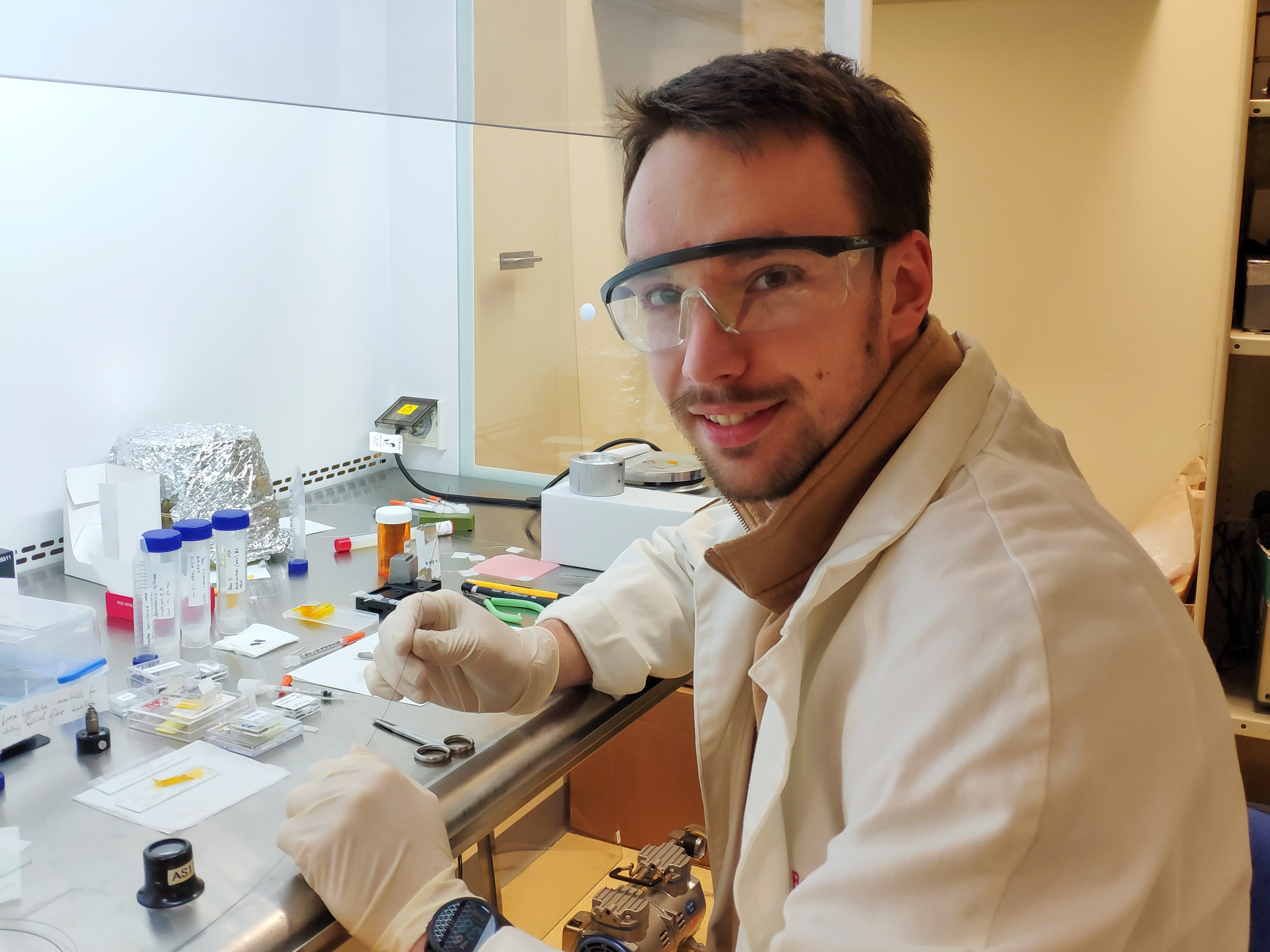Internship at the heart of groundbreaking coronary tech

PhD student, Toon Goris, during his internship with Nirtek
In summary
- Swinburne PhD student, Toon Goris, was offered an internship with leading-edge coronary technology start up, Nirtek
- Nirtek is developing a device that can be fed into the coronary arteries to evaluate the risk of heart attack and help saves lives
- Toon’s research flowed directly into the industry project and was integral to progressing the device to its current prototype
It is estimated that 17.9 million lives are lost to heart attacks each year. This makes heart failure the number one cause of death globally. The major cause of heart attack is unstable fatty deposits, called plaque, in the walls of the arteries. Current procedures can detect the presence and the degree of plaques, but they cannot determine if plaque is stable or unstable.
Swinburne PhD intern, Toon Goris, is working with ground-breaking medical device startup, Nirtek, to change that. Nirtek is developing a device that can be fed into a coronary artery to detect which plaques are unstable by using near infrared light.
Connecting industry and research
Nirtek Research and Development Program Manager Carla Zampaglione worked closely with Swinburne PhD supervisor, Professor Paul Stoddart, to help fill a gap in their team with Toon’s specialised skills.
“Paul spoke highly not only of Toon’s capability, but also the alignment of his unique skillset and the needs of our project,” says Carla.
Toon jumped at the idea of being able to develop his knowledge in an industry setting.
"The research Nirtek was doing was very close to my field, and I could directly translate my academic work," he explains.
Making a real contribution
With the support of the inclusive Nirtek team, Toon soon found himself becoming the 'go-to guy' for his area.
“In the industry setting I have enough knowledge to help. It feels like I can really contribute,” he says.
Toon created a testbed comprised of phantom tissues – complex artificial gels that mimic human tissue – for Nirtek to trial their device. This process was integral to advancing the design to its current prototype.
“My work with Nirtek has impact; everything I have done has shifted the design straight away,“ says Toon.
“Toon has been instrumental in helping Nirtek bridge the gap between evaluating theoretical research and actual real-life use cases of our cardiology diagnostics guidewire device, which assists in the prevention of heart attacks,” explains Carla.

Nirtek’s guidewire device concept uses near infrared light inside an artery to see if plaques are unstable
Beyond the science
As well as expanding his scientific knowledge and experience, working as part of a diverse team taught Toon to report confidently, communicate research in a way that is accessible, and not to be afraid to ask questions.
“My internship helped me in my teamwork skills, as well as my academic knowledge,” says Toon.
“It taught me that it's okay to say: I don't know this, but I'll figure it out by next week.“
“Toon brings a fantastic attitude and approach to learning to the Nirtek team,” says Carla.
“He has interacted with highly experienced technical personnel, the management team and the leadership team with the same upbeat, honest and enthusiastic manner.”
Work with impact
By the time Toon’s initial four-month placement was complete, he had become an integral part of the close-knit Nirtek team. They extended his contract, and he continues to work with Nirtek to fulfil the company’s vision of preventing heart attacks and saving lives.
The internship is hosted by Swinburne’s Medical Technology Victoria (MedTechVic) research hub as part of a larger partnership with Nirtek. This collaboration is focused on putting Victoria at the forefront of medical technology development and manufacturing, and seeding deep ties between research and industry.
-
Media Enquiries
Related articles
-

- Technology
- Education
- University
From humble beginnings to global impact: what Quitch did next
Dr Grainne Oates transforms Quitch from startup to global powerhouse, redefining education with Swinburne's support.Friday 01 March 2024 -

- Technology
World first project could see EVs charge wirelessly on the road
A $3 million grant by the Australian government will implement dynamic wireless charging technology into roads, unlocking the uptake of electric heavy vehicles and saving $324 billion by 2050.
Friday 16 February 2024 -

- Technology
- Science
- Sustainability
- Engineering
CSIRO and Swinburne invest in green steel and mineral processing to help industry get to net zero
CSIRO and Swinburne have established a new partnership to tackle global decarbonisation with innovative green steel and mineral processing research and development.
Thursday 01 February 2024 -

- Technology
- Business
Swinburne's Venture Cup unveils pioneering startups as entrepreneurs take centre stage
Swinburne University’s annual Venture Cup pitch night shines a spotlight on remarkable startups by students, staff and alumni.
Thursday 11 January 2024 -

- Technology
- University
Innovative approaches to teaching and learning funded by Adobe
A total of 10 diverse projects dedicated to improving the digital literacy of our students have been awarded Adobe Innovation Grants and Curriculum Innovation Program.
Wednesday 31 January 2024

